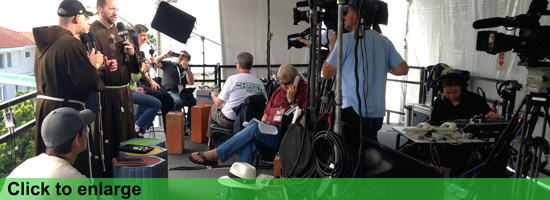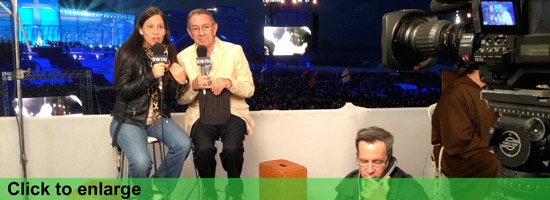
A Dutch EVS operator at Rio Carnival
A Dutch EVS operator at Carnival in Rio de Janeiro
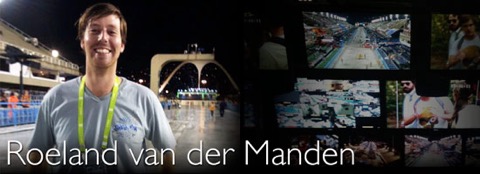
We all know Brazilian Carnival right?
We talked with Roeland van der Manden, one of the EVS Operators of last Carnival in Rio de Janeiro
BB: So Roeland, please tell us what is your function, and what does it include
Roeland: “EVS-operator. EVS is a system that makes live editing possible and makes replays at live events. I provide outside broadcast facilities with a premium service and it changes from a day to day basis. Some days I might be at a soccer game offering live replays to the director to then play out on live television to viewers at home, on another day I might be preparing for a live show taking all the pre-edited VT’s and feeding them into the EVS to then use as a tapeless method to play out to viewers at home”.
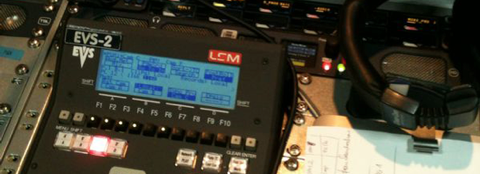
BB: Since when do you work as EVS operator
Roeland: “I have been working as an EVS-operator since 2008. Started in the Netherlands for Eyeworks and Endemol”.
BB: Which events did you already work on here in Brazil
Roeland: “I have worked for UFC coverages in Brazil since 2012, the Brazilian soccer championship, Libertadores Cup, world feed carnival 2014 in Rio de Janeiro and now I'm working for an American network at the IBC in Rio on the FIFA World Cup 2014”.
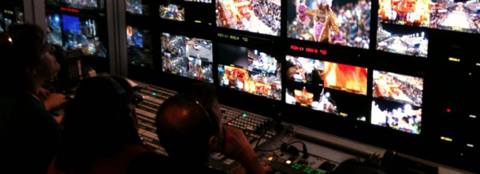
BB: What is the difference of the Brazilian events and events you worked on in the Netherlands
Roeland: “The difference between the events in Brazil and in the Netherlands is production and care. In the Netherlands, productions are bigger and made with more care. They do have all the equipment in Brazil to make events look really good but I think some of them maybe don't care enough to give it 100%. There's a lack of perfection at certain events. And planning is a big difference. For example, in Brazil I have never received a callsheet or any other useful info about the production. Even though many times things turn out to be fine "the Brazilian way”.
BB: How is communication with foreigners in general in your work
Roeland: “Communication has to be very good when working in EVS because a big part of the job is communication between director, producer and EVS. And most of the time communication has to be fast, because you work live”.
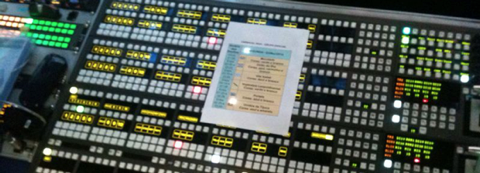
BB: What are the good and bad parts of Brazil as event host
Roeland: “Good part of the Brazilians is without a doubt the warmth character of the Brazilians. They are really open and enthusiast and there is always joy.
Any bad points would be the planning and the way they care about the production”.
BB: Do you notice a difference in foreign culture and your culture, in the way of working especially
Roeland: “A big difference in the two cultures is discipline and punctuality I think. Dutch people are very strict when at work. Brazilians are not. In Brazil it's very common that your colleague is a very good friend of you, in the Netherlands there's a clear difference between colleagues and friends. The majority of the cases at least”.
BB: How was it working on the last Carnival in Rio de Janeiro
Roeland: “Working at carnival was really spectacular. Like I mentioned before about the differences in size of the productions and care, you can compare the carnival for Globo with a great international event. I was very positively surprised”.
BB: Any specific technical difficulties during this event, and if so, these were due to what exactly
Roeland: “Work itself was normal at this event. We worked on the ultra slow replays which turned out to be very beautiful to show details about dancing. Very nice”.
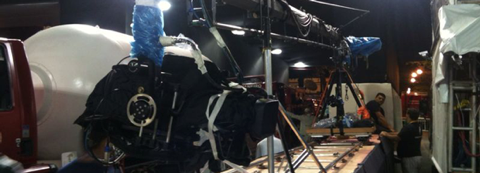
BB: Where there foreign broadcasters involved during the transmission
Roeland: “I believe not, the TV compound was from Globo only although the compound was quite big though”.
BB: What did you work on specifically during Carnival
Roeland: “We worked with the ultra slow replays of the dancers to show details and ordinary replays of the samba schools”.
BB: Which equipment did you use
Roeland: “EVS XT3. The newest model of EVS. And I-Movix”.
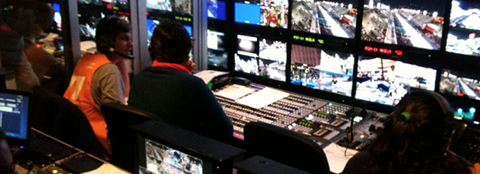
BB: Do you see a rise in the amount of (english speaking) Brazilian Broadcast Technicians needed during events in Brazil, and in which specific areas
Roeland: “Not really, this year you do but that has everything to do with the World Cup which is once. So not repeatedly I think”.
BB: Any good advice for the Brazilians in this area
Roeland: “It is always useful and of course important to be able to communicate in English”.
BB: How do you see the future for Brazilian broadcast Technicians the coming years with all upcoming foreign events
Roeland: “I think the Brazilian market is not going to change that much. The reason is because there are several big companies who provide their own services. There is not much of a freelance culture as there is in the US or Europe. People here prefer to work for a company instead of having their own business I think. So the market is not that competitive. There is Globo which owns almost all the channels here and than there's a long time nothing and than the rest.
But people should give their very best to show the international media out their that they're capable of producing big events”.
BB: What is the most important for you to be able to work with foreign companies
Roeland: “Foreign companies pay way better than the Brazilian ones. That for sure is an issue, further the production level is higher which makes it easier to work with them. Brazilian production level is not poor, but it's done by way less people so the conditions are harder and you can see that in the result”.
BB: Any other interesting things you have for us related to your work at last Carnival in Rio de Janeiro
Roeland: “Carnival was hard working but very satisfying and I really enjoyed it”.
Compilation of Carnival Rio de Janeiro 2014
So we hope this is, besides, fun to read, also a good help and insight information about broadcast events held in Brazil and what the future may hold.
Like us if you want on Facebook, and follow us on Twitter
mentioned:
Carnival Rio
EVS
I-Movix
FIFA worldcup 2014
Eyeworks
Endemol
TV Globo
UFC
UFC in Rio de Janeiro
UFC in Rio de Janeiro
The 2nd and 3rd of august BroadcastBrazil was in Rio de Janeiro, Brazil, at the UFC event.
We talked with Fernando Figueira, one of the Camera Operators of this UFC show, and had the chance to ask him some questions.
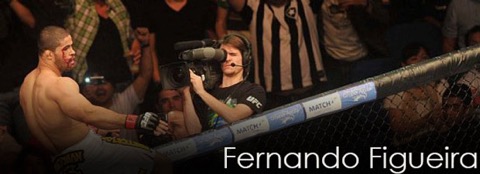
BB: So Fernando, please tell us what is your function, and what does it include
Fernando: “I am one of the Hand Held Camera Operators for the UFC events in Brazil”.
BB: How many shows are you on UFC in Brazil
Fernando: “I have worked at all the UFC Shows in Brazil, except the one that took place in Fortaleza”.
BB: What is the best part of the UFC events
Fernando: “The best part of the UFC shows is to be able to work with good professionals from all over the world”.
BB: What is the difference of Brazil and other countries at UFC events
Fernando: “At the UFC everything is detailed and structured. We receive a minute by minute script on each show, what makes our life much easier”.
BB: How is communication with foreigners in general in your work
Fernando: “ I am used working with a lot of foreigners, so I don't have any issues on communicating with them and I also made really good friends at those events”.
BB: What are the good and bad parts of Brazil as event host
Fernando: “UFC is getting bigger and bigger each day in Brazil, so hosting an event in different cities of the country will help it get even more popular.
The most difficult part of hosting international events in Brazil is to gather a good English Speaking Crew. We do have a lot of good professionals in the TV area but not all of them speak and/or understand English”.
BB: Do you notice a difference in foreign culture and your culture, in the way of working especially
Fernando: “On TV, all the engineering is the same. Sometimes we have to change the way things are done to accomodate a specific request from a different way of doing TV. But, as I mentioned, technically the process is the same all over the world. What really matters is the final result and a happy and satisfied client, no matter where they come from”.
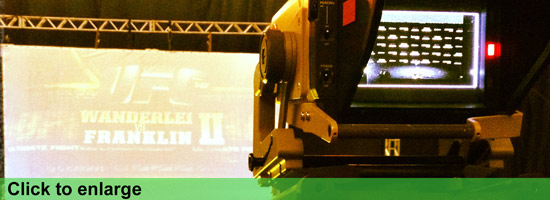
BB: Any specific technical difficulties this last UFC, and if so, these were due to what exactly
Fernando: “No specific problems at any of the UFC events”.
BB: Any good advice for the Brazilians in this area
Fernando: “It is very important to learn a second language, preferably English, due to the upcoming events in Brazil”.
BB: Do you see a rise in the amount of (english speaking) Brazilian Broadcast Technicians and Cameraman needed during the UFC in Brazil, and in which specific areas
Fernando: “ Till today it is still very hard to gather an english speaking crew here in Brazil.
BB: How do you see the future for Brazilian broadcast Technicians the coming years with all upcoming foreign events
Fernando: “Brazil has a really good future since we will have big events as the World Cup and Olympics. We are getting more investments in the area and that makes this kind of work stay even after these events”.
BB: What is the most important for you to be able to work with foreign companies
Fernando: “We are always learning, so be able to work with people from all over the world only brings more knowledge”.
BB: What kind of gear do you use
Fernando: “On UFC shows we work with an OB Van with 16 Grassvalley HD Cameras and 5.1 dolby áudio”.
BB: Any other international events you did this year? If so which ones and what was your function there.
Fernando: “I did the World Youth Day in Rio de janeiro where I worked as Producer, also I did Pororoca Live for CCTV China as an Transmission Coordinator”.
World Youth Day:
Pororoca Live Event, behind the scenes:
So we hope this is, besides, fun to read, also a good help and insight information about foreign broadcast events held in Brazil and what the future may hold.
More photo's available on our Broadcast Brazil Facebook page, you can find them here.
Like us if you want ;)
And see our former blogposts about the UFC event held in Belo Horizonte, Jaraguá do Sul and Fortaleza
mentioned:
UFC
GrassValley
Pororoca
World Youth Day
CCTV China
The Journey Of A Boskalis Dredge by Visuals Studio Brazil

RIO DE JANEIRO – Like in any career a workday of a journalist-director has its ‘everyday’ projects. But with some projects you only realize afterwards how special they really were. This reflection also occurs at this time of writing, when Broadcast Brazil asked me to put something down on paper about this recent documentary-project.
Often you only receive a few words; "... special transport ... a dredger through the jungle of Suriname on ... 350 tires ... say a sharp
challenge for both man and machine ... ". But as a director you instantly feel that with this meagre list of ingredients you have something special in the hands.
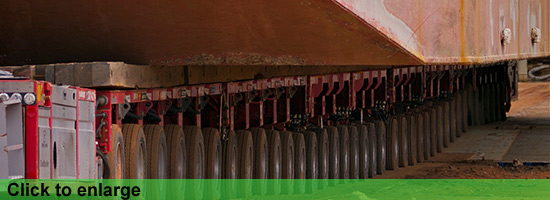
After the first contact with the Communication Department from the headquarters of Royal Boskalis Westminster, I was redirected to the regional manager in Paramaribo for further planning and details. He told me because of persistent and heavy rainfall in the last weeks, the transport has been postponed several times. Suriname deals with an unusual lot of water, where in a few weeks time more inches dropped then usually throughout the entire rain season.
But as experience shows ... delay is inherent in the maritime industry. Despite tight time schedules and a detailed scenario, the factor "weather" always comes unpredictable. And so the initial date for the transportation was shifted to three weeks later, hoping for some drier days. All in standby mode, meaning the calendar blocked, including my Belgian assisting cameraman who will fly straight too Paramaribo.
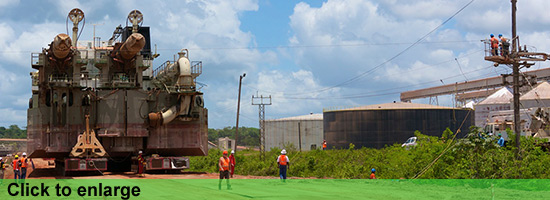
But unexpectedly the standby was two days shortened by an email with green light. The last two dry days indicates the start of an unique mobilization plan for the transport of one of the largest dredgers from the Boskalis fleet, the Orion. A huge cutter dredger of 1813 ton, 74 meters long and 15 meters wide, with its destination a bauxite mine south of Paramaribo. Here the Orion will excavate the valuable raw material for aluminium, for the next two years.
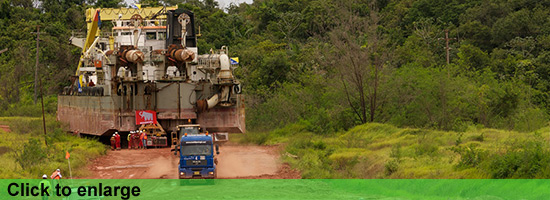
A month earlier, the Orion was put on a special transport ship, the Roll Dock Sea, in Abu Dhabi. Once arrived the cutter ship is put ashore at Paramaribo by means of a special constructed jetty to be able to put the ship on a 'train' of trailers, consisting of 305 air tires from the Dutch transport and heavy lifting company Mammoet.
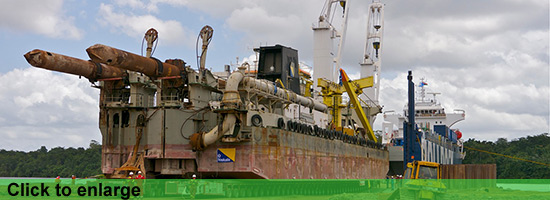
A carefully elaborated mobilization scenario shows the various 'obstacles' on the route during 14 kilometers during 13 days, from jetty to the final destination, a dry mine pit in a jungle lake.
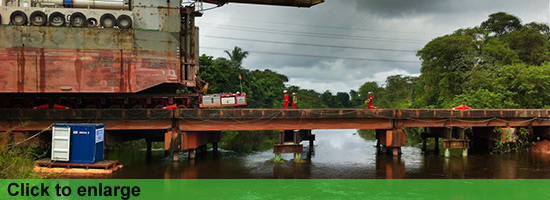
The Orion faces numerous challenges such as (too) low hanging power lines for its 15 meter height. Three sets of power masts had to be lifted, causing a temporarily electricity cut in the biggest part of Paramaribo city for a few hours.
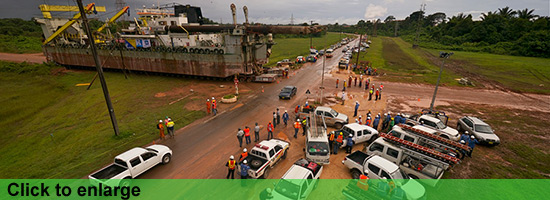
Another challenge is a narrow bridge that needs to be crossed. For this successful passage a special team reinforced and broadened the small bridge. For a (too) low viaduct a special bypass road was constructed, but the ultimate challenge the Orion had to deal with is the muddy and slippery road down to the special constructed launch pit. The trailers will be tested to the full to hold the heavy cutter downwards. The worse happens when one of the wheels of the trailer breaks. A big commotion appeared, but both professionalism and experiences make the teams decide to continue with calculated risk. Finally, after three hours, the Orion fleet is lowered at its final destination and ready for their mission in the next 80 weeks.

Not only an admirable mission by the men of Boskalis, but certainly a feat expertise of Dutch origin. For me and my camera assistant a huge challenge as well to capture this spectacle in a visual attractive way. The preview along the route showed already a considerable number of potential angles, but at the moment itself, it always takes improvisation in the constantly-changing conditions such as rain, bright sun and safety measures for that moment.
The various obstacles along the route were shot with 5 HD-cameras; a Panasonic AVCCAM and two Panasonic GH-1 DSLR cameras with variable lenses. The smaller HDs were mounted along the locations. For the title shot of the documentary we buried one of the cameras in the middle of the muddy road, where the huge Orion passed over perfectly. The snail's pace of the Orion on the trailers through the landscape turned out perfect for time-laps sequences, which, once in the editing studio back in Rio de Janeiro, could be speed up in special effects.
Overall a successful documentary and well- received by the Boskalis team about an exciting mission through the jungle under severe conditions in terms of weather and temperature.
Director – producer: Ernst Daniel NIjboer
2nd Camera – editor: Paolo de Graaff
video:
The Journey of a Dredge from Visuals Studio Brazil on Vimeo.
mentioned:
Visuals Studio Brazil
Boskalis
Mammoet Brazil
Panasonic
UFC - Rio de Janeiro
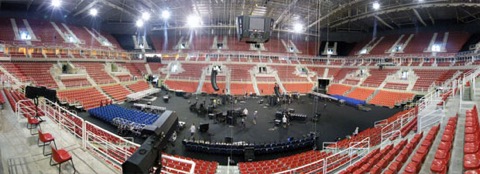
Brasil
After the huge success of the last UFC event in Rio de Janeiro on August 2011, the organization decided to have another UFC event in Rio, few months after the first edition. UFC is BIG in Brazil! Several local and foreign broadcast companies were on location to transmit live.The main TV Broadcasts were hosted by Alfacam Brasil, and two of their OB vans. Alfacam is a big international video-facility company, based in Belgium. They opened their Brazil office last year at the PoloRio Cine&Video in Rio de Janeiro, and are ready for the market in Brazil, and of course their goal, to host the FIFA World-cup 2014 & Olympic games 2016 in Brazil. Alfacam is a company with the capabilities and equipment for these international events, and provided the World-cup soccer & Olympic-games already before with OB-vans and classified people.
But also companies from Brazil are in Rio with their equipment and people, like Brasil Rig, Gabisom, Globo & GloboSat. Both Globosat & Globo brought their own OB-vans. Casablanca Online is delivering all satellite uplink facilities for live but also play-outs , and had 8 uplink trucks on site, to deliver the uplinks for the TV stations.
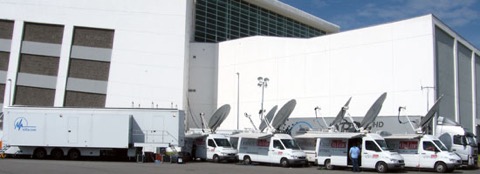
Foreign
One of the most important parts of this production is communications. Not only intercom between technicians cameramen, etcetera, but also the language. The main spoken language is english. For audio visual professionals to work in an international production like the UFC event, they need to be able to communicate, both in word and writing, English.
Nevertheless, walking on the production floor you also hear Flemish, Dutch & Portuguese. There is a mix of Europeans, Americans and Brazilians working together to produce the UFC event, apart from a few language problems here and there, this goes well because of the basic knowledge of english among the crew. It must be stressed however that it will be a challenge in the future of broadcasting in Brazil.
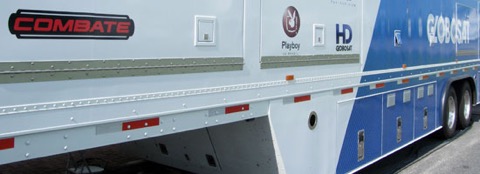
Event
The show went technically very well, but also the fighters from Brazil did their thing... they won a lot. We can expect the UFC back this year for sure in Rio de Janeiro or another city. These are important times for Broadcasting aligned companies in Brazil. With the 2 big events, the FIFA World-cup 2014 & Olympic games 2016 on our doorstep this UFC event shows that Brazil is technically ready for delivering top quality productions. If all personnel starts speaking and understanding better english there will be a wide market of jobs available for the local people.
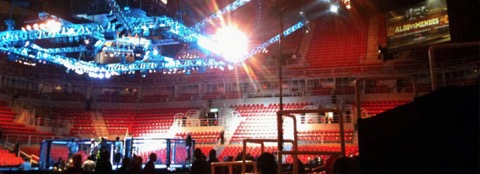
mentioned:
UFC
Alfacam Brasil
Casablanca Online
SporTV GloboSAT
Globo TV
